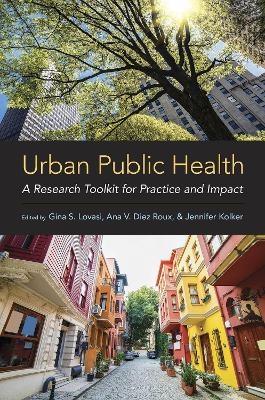
Urban Public Health
Oxford University Press Inc (Verlag)
978-0-19-088530-4 (ISBN)
Today, we know cities as shared spaces with the potential to both threaten and promote human health: while urban areas are known to amplify the transmission of epidemics like Ebola, urban residency is also associated with longer, healthier lives. Modern cities encompass a wide ecology of infrastructures, institutions and services that impact health, from access to improved sanitation and early childhood education to the design of buildings and transportation systems. So how has this centuries-long transformation in human settlement affected the mindset surrounding public health research and practice?
Urban Public Health is an interdisciplinary collaboration from experts across the globe that approaches the issue of urban health research from a uniquely public health orientation. The carefully crafted and thoughtful chapters in this volume grapple with the complexity of the urban setting as a physical and social space while also providing an abundance of global and local examples of current urban health practices. Urban Public Health is divided into four pragmatic sections which cover core conceptual models of public health and their inequities, methods of urban health research assessment, methods of urban health research analysis and explanation, and ultimately, opportunities for urban health research to inform action through partnership and collaboration, including those which elevate community voices and capacities. An accessible guide for both students and researchers alike, Urban Public Health shines a light on how to understand, measure and change the urban setting so that cities grow, people thrive, and no one is left behind.
Gina S. Lovasi, PhD, MPH is Co-Director of the Urban Health Collaborative and Dornsife Associate Professor of Urban Health at Drexel University. Dr. Lovasi received her public health training at the University of Washington. Her research projects reflect a tension between loving to work with large datasets to chip away at big questions, and a fascination with the insights gained through field data collection to tackle local information needs. Ana V. Diez Roux, MD, PhD, MPH, is Dean and Distinguished University Professor of Epidemiology in the Dornsife School of Public Health at Drexel University. Originally trained as a pediatrician in her native Buenos Aires, she completed public health training at the Johns Hopkins University School of Hygiene and Public Health. Her work on neighborhood health effects has been highly influential in the policy debate on population health and its determinants. Jennifer Kolker, MPH is Associate Dean for Public Health Practice and Clinical Professor of Health Management and Policy in the Dornsife School of Public Health at Drexel University.
Table of Contents
Contributing Authors
Foreword
Preface
Part I - Introduction to Urban Health
Chapter 1. What is Urban Health? Defining the Geographic and Substantive Scope
Chapter 2. Global Urbanization and Health Trends
Chapter 3. Conceptual Models and Frameworks for Understanding the Links Between Urban Environments and Health
Chapter 4. Urban Health Inequities
Part II - Identifying and Collecting Data for Urban Health Research
Chapter 5. Assessment of the Urban Environment: Measurement Scales, Modes, and Metrics
Chapter 6. Human Perceptions and Reflections on the Urban Context
Chapter 7. Characterizing and Mapping Health in Urban Areas
Part III - Tools for working with urban health data
Chapter 8. Managing and Integrating Diverse Sources of Urban Data
Chapter 9. Analysis Strategies for Relating the Urban Environment to Health
Chapter 10. What Do We Know About What Works? Synthesizing the Evidence
Chapter 11: Systems approaches to urban health
Part IV: From Evidence into Action
Chapter 12. Partnerships and Collaboration: An Urban Focus
Chapter 13. Community Engagement and Participatory Approaches for Urban Health
Chapter 14: Policy in Urban Health: The Power of Cities to Translate Science into Action
Chapter 15: Dissemination of Urban Health Research to Maximize Impact
Concluding Remarks
Acknowledgements
About the Authors
| Erscheinungsdatum | 05.10.2020 |
|---|---|
| Verlagsort | New York |
| Sprache | englisch |
| Maße | 155 x 231 mm |
| Gewicht | 522 g |
| Themenwelt | Studium ► Querschnittsbereiche ► Prävention / Gesundheitsförderung |
| Naturwissenschaften ► Geowissenschaften ► Geografie / Kartografie | |
| ISBN-10 | 0-19-088530-0 / 0190885300 |
| ISBN-13 | 978-0-19-088530-4 / 9780190885304 |
| Zustand | Neuware |
| Haben Sie eine Frage zum Produkt? |
aus dem Bereich


